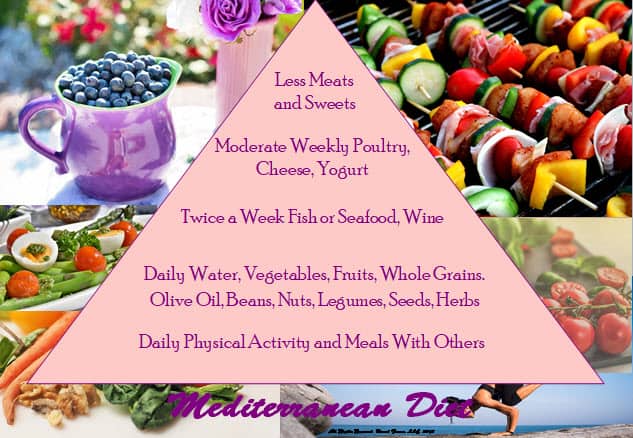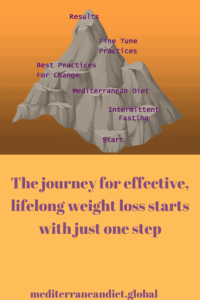
I am a bit surprised when people on social media and elsewhere ask the question “what is the best way to lose weight? ”
The real question should be “Can you lose all the weight you need permanently without counting calories, feeling hungry, all while getting healthier?”
We have a group of people that need to lose weight due to illness, doctor’s orders, self-esteem, longevity, and myriad other reasons. There are two converging practices that make the answer to the question above an emphatic Yes! The people in my Facebook group are embracing these two separately and together with fantastic results.
The Mediterranean Diet and Intermittent Fasting when combined together enable everyone to meet their weight loss goals without pills, expensive programs, tasteless food, starvation and deprivation or any of the other impediments to healthy weight loss. Even better, these two practices can easily be turned into lifelong habits so that your quality of life is better throughout a longer life.

Neither of these ways of eating are a secret, since the benefits of the Mediterranean Diet were first established it has been noted as the healthiest diet on nearly every single study, year after year, study after study. There has been a lot of buzz recently about intermittent fasting, with celebrities and health experts singing it’s praises. . This article describes what those of us have been intermittent fasting for years already knew, it is not difficult to adopt and the benefits are clear and profound.
Wanting a sustainable way of eating that I could maintain for life, a few years back I did the research and came up with the Mediterranean Diet. Even before confirming my selection with continuing research it made sense for me. The Mediterranean Diet was a continuation of the diet I was accustomed to with some key differences. I was still sugar, salt and saturated fat addicted and needed to sharply reduce those things in my diet while adding Extra Virgin Olive Oil, and more fruits and vegetables. I was able to do that through self-control and progressive extremism, I also started experimenting with fasting. While doing some extreme fasts I found out through my research that they were not as beneficial as what has now become standard intermittent fasting. So I continued experimenting, trying each version of intermittent fasting and noting the results.
As these two practices became healthy habits for me it became clear that with the intermittent fasting I will eat less food as my stomach shrinks; and I would want the food I eat to be as good as possible for me. As my body changed I became fat adapted, meaning that my body now burned stored fat instead of carbs and sugars. I also found that I could accelerate achieving the state of autophagy where the body cleanses itself of dead cells. The best ways to get your body into this state is by getting restorative sleep, doing high intensity interval training, taking resveratrol, cinnamon, and turmeric, and moving to a high fat diet. That’s right, you burn more fat by eating unsaturated fats like avocados and other superfoods and Extra Virgin Olive Oil, the cornerstone of the Mediterranean Diet.

Are these fads? No they are not. The Mediterranean diet has been followed for millennia by people in the Mediterranean region and is easily adapted to foods worldwide. Up until the last hundred years when sugar and salt became readily available the majority of people had healthier plant based diets with less of the harmful effects of sugar, salt and saturated fats. Intermittent fasting has been inadvertently practiced by all mammals including humans throughout history as food was not always available on a daily basis. Our bodies have actually done very well with intermittent fasting, now there is added science behind the benefits and strategies to make it easier to adopt and supplements to make the fasting more effective.
Planning and preparation are key whether you stay at home or travel constantly like I do. Practicing the Mediterranean Diet means cooking, preparing meals for now or in advance and sticking to what you have prepared. It is actually easier if you also intermittent fast as you have a window that closes where you drink water or unsweetened coffee or tea only and do not snack. This reduces the number of meals that you eat each day and the preparation time as well. I recommend preparing staples in a big cooking batch and freezing or refrigerating them for use later. This allows you to stay on the program if you are traveling, going to work, doctor’s appointments, or kid’s soccer matches. The other thing I do when traveling is mostly dine at the grocery store. Intermittent fasting also makes travel easier as you don’t need to find a place to dine in unfamiliar places as much. My personal fasting window is generally from 11 AM until 6AM the next day. This means I don’t need to find a place to eat at night, which works well for me.
The Mediterranean Diet works well for me and others in my group because of intermittent fasting which works well due to being on the Mediterranean Diet. My body stays fat adapted, goes into the state of autophagy daily, I am at the perfect weight and it is almost effortless. I don’t stress over calories or the perfect combination of ingredients, I follow the recipes, and if I am not compliant some evening I don’t worry about it. These combined practices are a perfect complement to each other, those serious about losing weight for good just need to follow my guidelines back to health.
Get Started, join our fun informative Mediterranean Diet Facebook Group here
